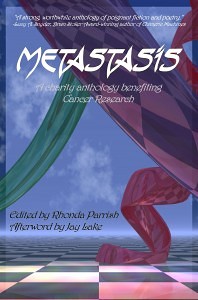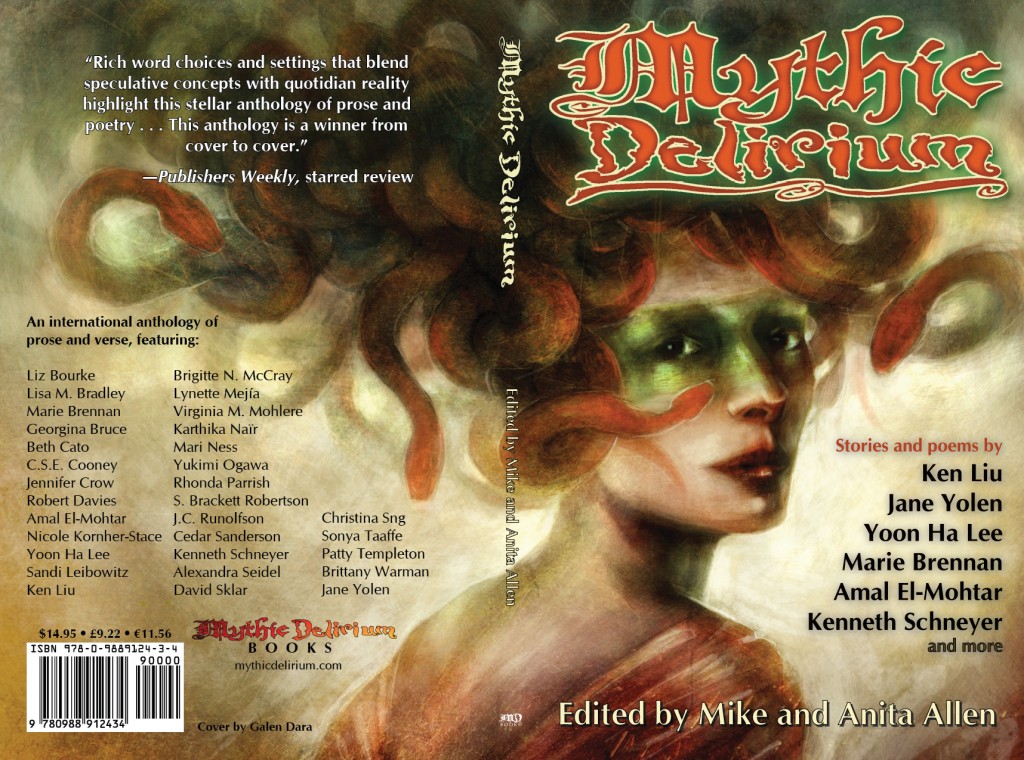 David Sklar is the next contributor in the series of Metastasis interviews I’m hosting here on my blog. David’s story, Quantum Therapy, is a weird and wonderful contribution to this anthology.
David Sklar is the next contributor in the series of Metastasis interviews I’m hosting here on my blog. David’s story, Quantum Therapy, is a weird and wonderful contribution to this anthology.
Who or what was the inspiration for your story in Metastasis?
As best I recall it, “Quantum Therapy” didn’t start with thinking about cancer; it started with watching a TV show about string theory and thinking, “How would they apply this to medicine?” Because it seems like, whenever people learn something new about how the world works, they try to apply it in three places: In war, in medicine, and in business. So it’s “how can I use this to kill people?” “how can I use this to save people?” and “how can it make me money?” And I’m not interested in war, and not as interested in business as I really should be, but there’s fascinating stuff going on in medicine these days, with stuff like nanobots and biologic therapies. So what would be the medical application of tiny particles that move in and out of alternate universes?
How has cancer touched your life?
Cancer hasn’t hit my life as hard as it has some other people I know. I lost three grandparents to cancer, but they were all in their late 70s or 80s. The one who died young was killed by a heart attack. And I’ve got a sibling who died of myesthenia gravis.
My mother’s around 70 now, and she had cancer, but she survived. And a couple of relatives by marriage have also survived cancer not long ago. So cancer hasn’t hit me personally that hard.
But I’ve got friends who’ve had it worse. Some who lost their mother to cancer, and another good friend whose brother-in-law passed away. Around my age, and he got cancer of the liver. He beat his prognosis by years, but in the end it still laid him low, and it left behind a young widow and two kids, and now they have to grow up without their dad.
Another thing, though I don’t think it’s what you meant when you asked the question–cancer has been a part of my professional life. I’ve been writing and editing medical communications since 1998–sometimes advertising, sometimes more complicated scientific writing to inform doctors about new treatments. And I’ve learned a lot about cancer on the job. A lot of the science in this story–not all of it, but a lot–is based on things I’ve read about in the workplace.
When it comes to cancer, what gives you hope?
Hope’s a funny thing. I mean, ultimately, we’re all gonna die of something, and there’s no way around that. But when it comes to cancer–when it comes to a lot of diseases that used to be incurable–there are just some fascinating things going on in medicine, like I said.
Like angiogenesis inhibitors. You know, when a tumor grows, the old way to treat it was to kill off all the growing cells for a while, and hope they get the cancer with all the rest. That’s what chemotherapy is. But now, they think “What does a tumor need?” It needs oxygen, so it needs blood. So inside of a tumor there’s this tangle of new veins and arteries, growing fast to support the tumor’s rapid growth. But the rest of your body has most of the veins and arteries it needs already. So they have these drugs that stop your body from growing any new veins–instead of killing all the growing cells, they just stop what the cancer needs most, and they starve the tumor.
And then there’s new ways to target the cancer–so instead of putting chemo drugs into your whole body, they’re developing new ways to tag the cancer cells so they can deliver the medicine there and only there. That way they can give a higher dose where you need it, and little or none of the medicine where you don’t.
While I was revising “Quantum Therapy,” there was an advance in this targeted medicine, and it made headlines. I was incorporating technical comments from my friend Jenn, who’s an MD in Colorado, and I see this article in my newsfeed, about–I think they called them nanoparticles–so I worked them into the story, just in a mention in one scene, and I e-mailed Jenn the article, and she looked up more about it and told me some more about the nuances of how it works. That was pretty cool.
And you know, what if she tells a colleague about this article, and that colleague uses this therapy? My story may save a life. Probably not, because Jenn’s not an oncologist, she’s in family practice. And because when this treatment becomes viable, it will probably be in lots of oncology journals. But all the same, silly though it may be, it’s fun to think that my research for a work of fiction might result in somebody getting a lifesaving treatment.
for a work of fiction might result in somebody getting a lifesaving treatment.
David Sklar‘s work has appeared in an odd eclectitude of places, including Strange Horizons, Ladybug, and Scheherazade’s Façade. As a freelance writer and medical editor, David has researched cutting-edge cancer treatments and served as managing editor of a newsletter for health care professionals who treat melanoma. This story of Schrödinger’s cancer is the first time he has applied this experience to his fiction writing.The medical science in “Quantum Therapy” was reviewed by Jenn Hronkin, MD. The quantum physics was reviewed by Sandy McReynolds, PhD, who simultaneously does and does not attest to its veracity.For more about David and his work, please visit http://davidwriting.com
Metastasis is available at:
Amazon.com
Paperback – $14.95
Kindle – $6.95
Kobo
ePub – $6.95
Smashwords — Use coupon code LM63L in order to receive 25% off your order
ePub – $6.95
Kindle – $6.95
PDF – $6.95
Createspace — Use coupon code TGERED9J in order to receive 25% off your order
Paperback – $14.95
All coupons codes expire on October 31, 2013.



